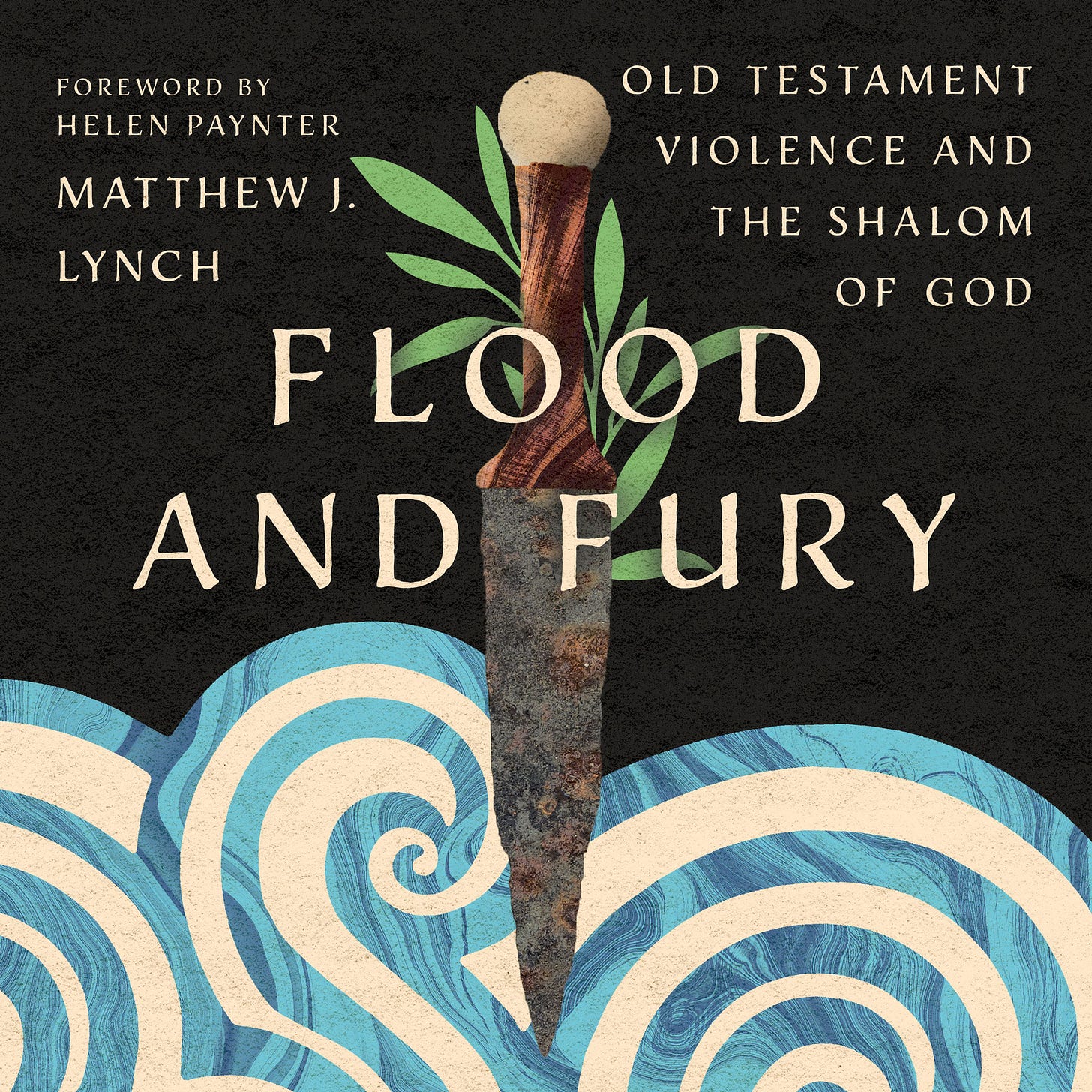Flood and Fury: Old Testament Violence and the Shalom of God
Book review on Matthew Lynch's new work
Highly recommend Matthew Lynch’s new work Flood and Fury. He examines Old Testament violence in light of the character of God and confusing brutality in the backdrop of the Biblical narrative. Lynch deals skillfully with difficult questions about God’s character. If he is love, then why genocide? If God wants all to know him and come to a knowledge of the truth, then why wipe all of humanity out in the flood?
At a recent presentation discussing how terrorism ends and the research on deradicalization, I was making a case for how militaristic intervention and harsh retaliation often prove ineffective. In fact, these methods create more violence (more here). One person in the audience, a committed Christian, visibly distraut by Oct 7 and the Gaza war, insisted that some ideologies and people are so bad that “they just need to be wiped out.” After all, he said, God told Israel to annihilate the Amalekites and told Joshua to conquer Jericho. My read was that he was channeling some recent rhetoric about “unflinching moral judgement” surrounding Oct 7 and Hamas in Gaza and hadn’t processed the tensions and moral resolution through into the new Kingdom Jesus inaugurated. The sentiment is prevalent today even among Christians who claim the Prince of Peace as their savior.
This tension of a biblical narrative containing violent stories and a turn the other cheek - love your enemies Jesus - has no easy resolution. Lynch deals with the Canaanite conquest and the great flood and offers insight that doesn’t compromise God’s character or require us to sidestep the persistent challenge of the presence of violence and bloodshed. He insists that the fall caused all of creation to turn on itself and that violence, not God, is the problem.
Everyone should delve into this and do the hermeneutical work of understanding the thrust of the narrative before deciding there’s people today that '“just need to be wiped out.” It was obvious something was off even 2000 years ago in common Jewish understanding when Jesus said “you have heard it was said… but I say to you.” We need a corrective to our culturally bound opinions on violence just like Jesus’ Jewish, scripture taught audience did in their day.
The interpretive key, he insists, is four things right from Genesis 1:
Genesis 1 focuses our reading of Gen 1-11, and really of the whole Bible. The Old Testament offers this challenge: “Read the whole thrust of Scripture this way, but looking through the eyes of Genesis, which sits first in the canon because it anticipates the whole.” When we do this, we recognize that violence has no pride of place; that humanity reflects a God who delegates and distributes power; that humanity’s role in creation is decidedly life-promoting; and that creation’s rhythm is oriented towards restoration and not destruction. In sum, it offers a compelling vision of shalom - creational and right-relating wholeness - as the ideal.
He notes that we have to hold this in tension with the the assertions of God’s character. Process this:
Some claims about God’s character are more central than others. Exodus 24:6-7 is key here:
“And [THE LORD] passed in front of Moses, proclaiming “The Lord , the Lord, the compassionate and gracious God, slow to anger, abounding in love and faithfulness, maintaining love to thousands, and forgiving wickedness, rebellion and sin. Yet he does not leave the guilty unpunished, he punishes the children and their children for the sin of the parents to the third and fourth generation.”
Notice the tension… judgement and mercy, but the scale is tipped toward mercy. His mercy dominates his character.
So, Lynch implores the reader,
“let’s let the bible do its work of placing violent texts in relation to core claims about creation (that’s meant to be nonviolent) the stories of Scripture (which give us multiple angles on difficult topics), and God (who is fundamentally merciful).”
Also where is Jesus in all of this?
A Christian approach to violence in the Old Testament relates the stories of Israel and the story of Jesus. Jesus is the logical climax of Israel’s stories.
Christians can be confident that Jesus himself was shaped by the Old Testament, all of it, even the hard bits. And, he understood himself to be the fulfillment of the Old Testament. So, how could a text, that yes, contains troubling accounts, shape and foster a life and teachings like Jesus’?
Other helpful points abound. Like the ‘minority report’ between God’s command to “utterly destroy” and other accounts of Canaan conquest in the Torah. They seem to contradict. For example Deut 7:22 says “The Lord your God will drive out the nations little by little. You will not be allowed to eliminate them all at once…” So, what gives? Why is this contradictory to other commands or statements?
Lynch coaches the reader in good hermeneutics and critical cultural artifacts like Semitic rhetorical devices. ‘10,000’s upon 10,000’s’ and ‘utterly destroy’ may be more hyperbole expressing victory than factual, historical literal terms for example.
In conclusion, Lynch says, the moral tension of violence can’t be solved… its a ‘wicked problem’ resistant to satisfactory resolution. Violence is a subset of the problem of evil which touches on thorny themes like divine sovereignty and human free will. Some things remain out of our finite mind’s reach.
That said, we can rely on the foundational truth of God’s mercy far exceeding his wrath, he is a God that loves and longs to show mercy and is moving all of history towards shalom. He invites humans into relationship so that our pleadings can “persuade God to set limits on his judgement and provoke God into exercising his mercy.”
Compelling, rich material for a day and age saturated with violence.




